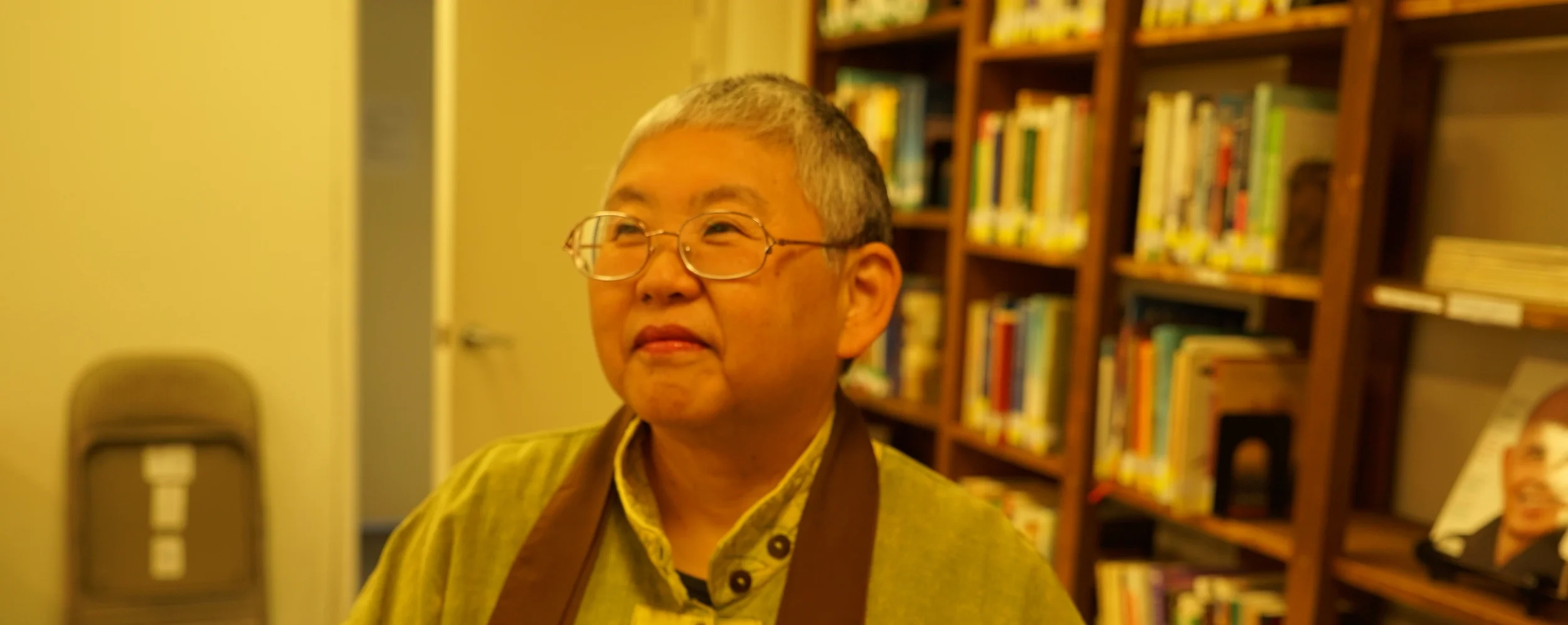About Mushim
Born in 1954 and raised in rural Ohio, Mushim Ikeda (Patricia Y. Ikeda, Patricia Ikeda-Nash) remembers the gorgeous sunsets in the greater Akron area that were caused by pollution from the tire factories. Many of her public school classmates came from West Virginian families who had migrated north to find work. As heads of the only Japanese American family in the community, her Nisei parents altered the pronunciation of “Ikeda” to try to make it more palatable to others and to facilitate the assimilation of their three children into the dominant society. Later, in the seventies and eighties, as the Asian American movement gained momentum, two out of the three children in her family switched back to the Japanese pronunciation of “Ikeda.” Thus, threads of oppression, assimilation, and resistance were woven throughout Mushim’s childhood and youth, along with air raid drills in elementary school during the Cold War era in which the U.S. feared nuclear bombing by Russia; the civil rights era’s marches, protests, and assassinations; and, later, news of resistance to the war in Vietnam, the hippie movement, and the use of psychedelic drugs to expand consciousness.
Under her secular name, Patricia Y. Ikeda, Mushim was among the first Asian American poets to publish, in a volume of poems published by Cleveland State University in 1978 and in the 1983 anthology Breaking Silence: An Anthology of Contemporary Asian American Poets. After receiving her MFA in English (poetry writing) from the University of Iowa Graduate Writers Workshop, she jumped the tracks of a potential career teaching creative writing and contemporary literature in colleges and universities, and an increasingly urgent spiritual quest led her to renounce what belongings she had and to move into the just-starting-up Zen Buddhist Temple-Ann Arbor, Michigan, as a full time resident under a vow of poverty, in May 1983. Designated the office manager, she began with a landline phone, a small wooden bench to write on, some pens, the temple checkbook, and a shoebox for petty cash and receipts, and over the next several years helped to build the temple along with a diverse Sangha (spiritual community) that included Zen practitioners from the U.S., Mexico, Canada, Korea and Japan.
A period of Dharma bumming throughout the U.S. and to the monasteries of South Korea and back from 1986 through 1988 came to a close and a new chapter in Mushim’s life began with the birth of her son in 1989 in Northern California, and the instruction from several Asian Zen teachers to direct her spiritual practice toward raising her child. She also received encouragement to begin writing again, in whatever small periods of time that she could carve out from parenting, and slowly began to publish new work, including a quarterly column on Buddhist family practice published in the Buddhist Peace Fellowship’s magazine, Turning Wheel, over a period of ten years, and which chronicled her family life with the partner who became her son’s adoptive father, the child, and a Siamese cat who began visiting every day and then eventually moved in to their small apartment in Oakland.
Since that time, Mushim has become widely known for her down-to-earth, humorous, and penetrating approach to Dharma and social transformation. Mushim is currently a socially-engaged Buddhist teacher, mindfulness meditation teacher, social justice activist, author, and diversity and inclusion facilitator based in Oakland, California. She teaches primarily at the East Bay Meditation Center in downtown Oakland, where she also served on the board of directors, known as the Leadership Sangha, for seven years. She now works part-time on EBMC’s staff as the community coordinator.
Mushim has taught residential meditation retreats for people of color, social justice activists, and women nationally, and her work is based in values of cultural humility, acknowledging the wisdom that is ever-present in individuals and collectives, and the need for expression, empowerment, and co-creative self-determination in marginalized communities. Mushim has been featured in the award-winning documentary film Between the Lines: Asian American Women’s Poetry and as one of three subjects in the documentary Acting on Faith: Women’s New Religious Activism in America, distributed by the Pluralism Project at Harvard University.
As a writer, Mushim is the recipient of the first Alice Hayes Fellowship from the Ragdale Foundation to support a one-month residency for a writer working on social justice and environmental issues. She has been named an expert panelist of the Global Diversity and Inclusion Benchmarks, an Open Source online resource available through the Diversity Collegium. Mushim is also the recipient of the 2014 Gil A. Lopez Peacemaker Award from the Association for Dispute Resolution of Northern California, recognizing her innovative one-year program, Practice in Transformative Action (PiTA), mindfulness training for social justice activists, at East Bay Meditation Center. In September 2015 she received an honorary Doctor of Sacred Theology (sacrae theologiae) degree from the Starr King School for the Ministry.
Picture taken by Rivka Shapiro, June 16, 2015 in the library at East Bay Meditation Center

